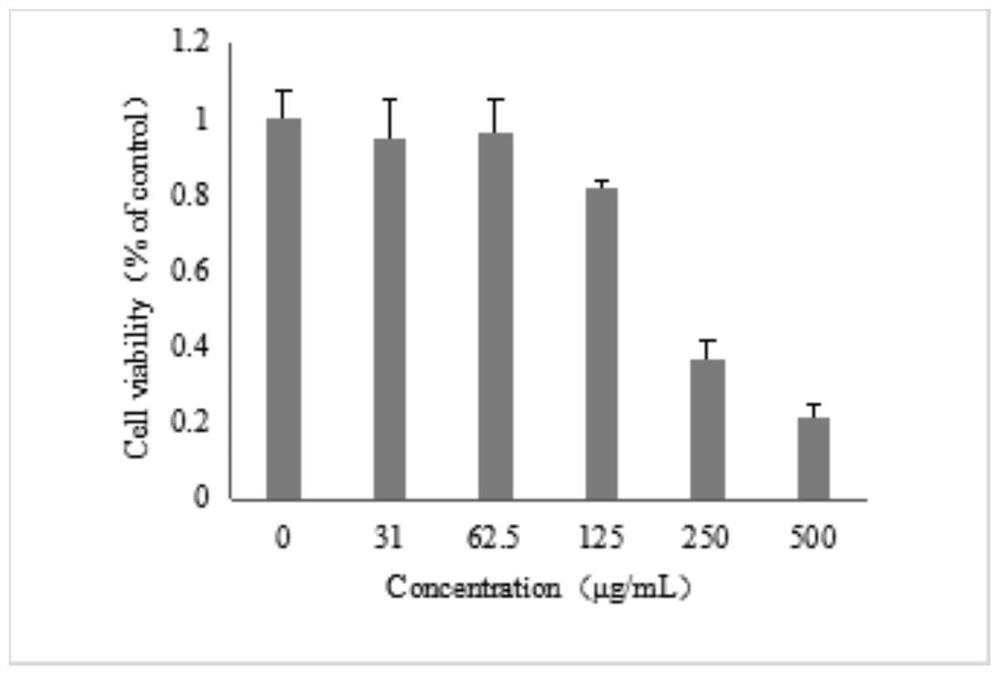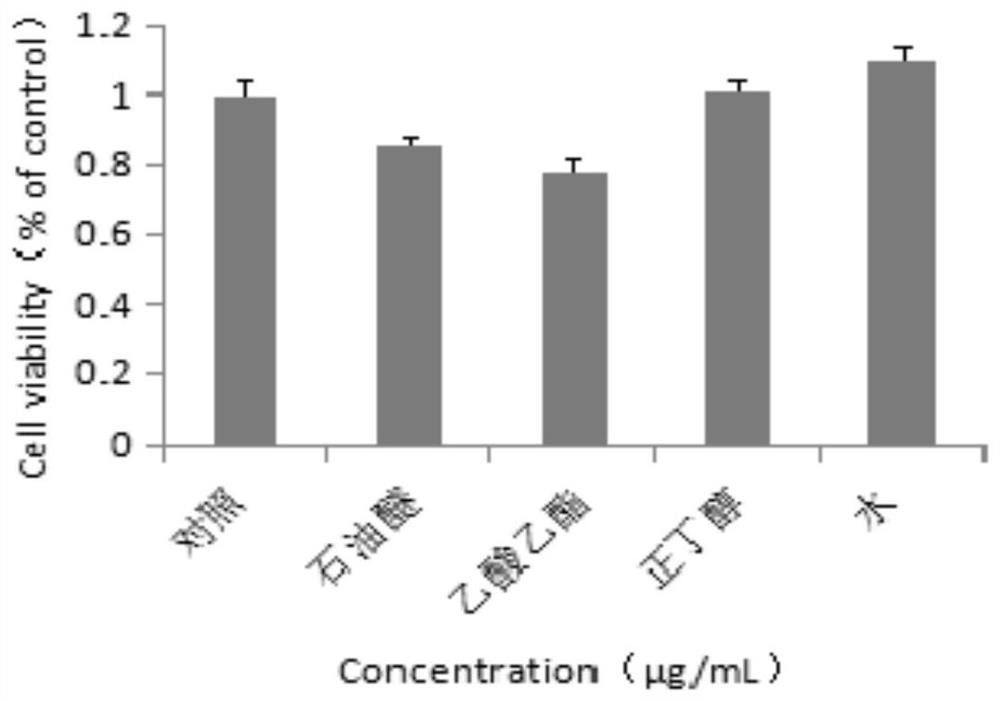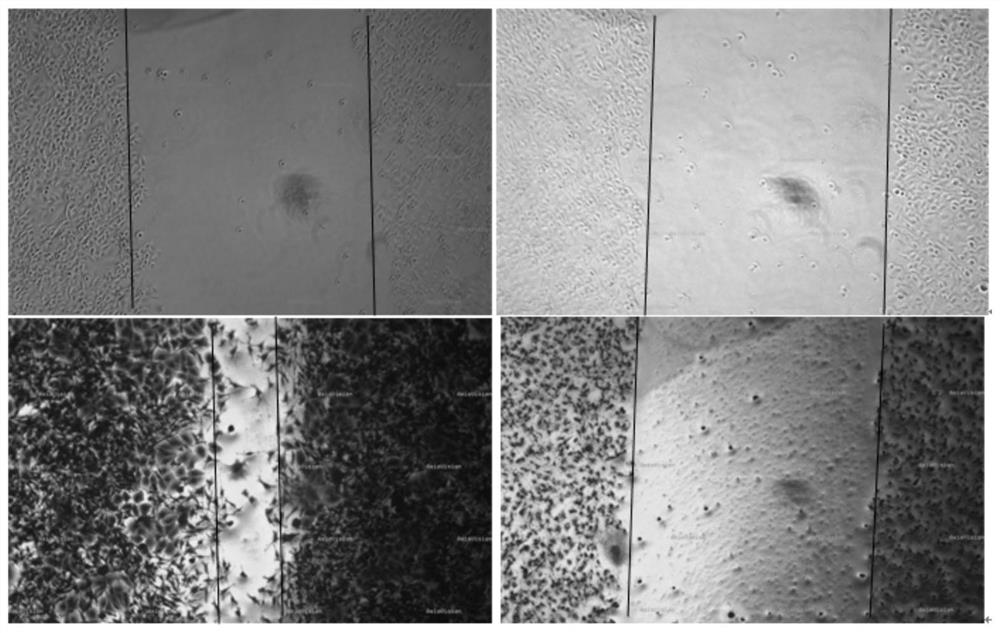Application of Passiflora Officinalis Extract in Preparation of Drugs for Prevention and Treatment of Breast Cancer
A breast cancer and extract technology, which is applied to the application field of passionflower extract in the preparation of breast cancer prevention and treatment drugs, can solve the problems of large adverse reactions and low water solubility, achieve good anti-breast cancer activity, inhibit proliferation, The effect of inhibiting the cell cycle of breast cancer
- Summary
- Abstract
- Description
- Claims
- Application Information
AI Technical Summary
Problems solved by technology
Method used
Image
Examples
Embodiment 1
[0032] Example 1 Extraction of active ingredients from Passiflora vine leaves
[0033] Experimental material: Purple Passiflora (Purple Passiflora P. edulis ) of the vine leaves were collected from Chengmai, Haikou City, Hainan Province.
[0034] The collected vine leaves were dried in an oven at 40°C, pulverized, passed through a 40-mesh sieve, soaked in 80% ethanol at a volume ratio of 1:5, and extracted by ultrasonic for 3 times, 30 min each time. The extract is concentrated into an extract extract through reduced pressure rotary evaporation, and the extract extract is freeze-dried to obtain an extract dry powder; the extract dry powder is dissolved in water to form an extract dry powder solution, and then an extractant petroleum ether is added for extraction. The liquid was evaporated under reduced pressure to obtain Passiflora vine leaf extract.
[0035] The volume of the extractant is twice that of the extract dry powder solution. The volume ratio of described ethano...
Embodiment 2
[0036] Example 2 CCK-8 method to measure the activity of inhibiting the proliferation of breast cancer cells
[0037] Dissolve the Passiflora vine leaf extract of Example 1 with DMSO solvent to prepare the Passiflora vine leaf extract solutions of different concentrations (31, 62.5, 125, 250, 500 μg / mL) for cell viability test, and make the culture medium. The DMSO content is less than 0.1%.
[0038] In a 96-well plate, about 4000 MDA-MB-231 cells were inoculated in each well, and after the cells adhered to the wall, the above DMEM medium (containing 0.25% HEPES) of the Passiflora vine leaf extract of different concentrations was added, and 0.1% DMSO was added. Medium is a negative control. Add CCK-8 after 72h of treatment, put in CO 2 After 1 h in the incubator, the absorbance at 405 nm was read with a microplate reader, and cell viability = (A blank group-A treatment group) / A blank group × 100%.
[0039] The experimental results show that the ethanol extracts of Passiflor...
Embodiment 3
[0041] Example 3 Scratch method to measure the activity of inhibiting migration of breast cancer cells
[0042] 24-well plate by 2×10 per well 5MDA-MB-231 cells in logarithmic growth phase were inoculated with the number of cells, and after 24 hours of adherence, the cells were scratched with a pipette tip, the floating cells were washed away with PBS, and the Passiflora vine leaf extract described in Example 1 was dissolved in DMSO. Passiflora vine leaf extracts of different concentrations (25, 50, 100, 200, and 400 μg / mL) were obtained. After 24 hours, the cells were stained with crystal violet and photographed under a microscope. The changes in the scratch area before and after treatment were counted, and the inhibitory migration rate was calculated. .
[0043] The experimental results show that: different concentrations of Passiflora vine leaf extracts have the activity of inhibiting the migration of MDA-MB-231 cells, and the average inhibition rate of 400 μg / mL treatment...
PUM
 Login to View More
Login to View More Abstract
Description
Claims
Application Information
 Login to View More
Login to View More - R&D
- Intellectual Property
- Life Sciences
- Materials
- Tech Scout
- Unparalleled Data Quality
- Higher Quality Content
- 60% Fewer Hallucinations
Browse by: Latest US Patents, China's latest patents, Technical Efficacy Thesaurus, Application Domain, Technology Topic, Popular Technical Reports.
© 2025 PatSnap. All rights reserved.Legal|Privacy policy|Modern Slavery Act Transparency Statement|Sitemap|About US| Contact US: help@patsnap.com



